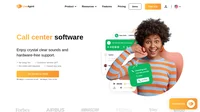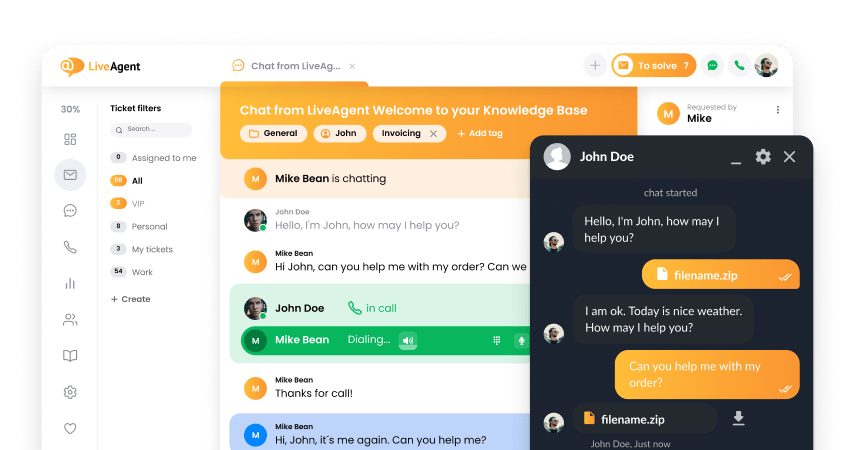In the fast-paced business environment, the key to streamlined, efficient customer service lies in the use of effective contact center software. Exactly what is this software, how does it differ from traditional call center software, and which is the best fit for your business?
This comprehensive guide will address all these questions, providing expert reviews of the top 12 contact center software in today’s market. We’ll walk you through the list of 7 must-have features for a cloud contact center solution and share insights on how your business could see substantial profit increases from leveraging the right contact center software.
Furthermore, we’ll look at those pivotal factors to consider while selecting software and help you identify the right time for your business to acquire one. Let’s dive in and empower your customer service efforts!
Table of contents
- Comparison table of top 5 contact center software
- What is contact center software?
- Review of the top 12 contact center software
- How to choose the right contact center software for your business?
- How can your business profit from contact center software?
- Factors to consider while deciding on contact center software
- When is the right time to acquire contact center software?
- Conclusion
Comparison table of top 5 contact center software
To make your decision process easier, we have compiled a table of the top 5 contact center software options with their Capterra ratings, number of integrations, free version and trial options, and price range. Whether you run a small business or a large-scale enterprise, there is a solution that will fit your needs.
| Platform | Capterra rating | Integrations | Free version | Free trial | Price range |
|---|---|---|---|---|---|
| LiveAgent | 4.7 | 220+ | ✅Yes | ✅Yes | $15 agent/m |
| Nextiva | 4.6 | 15+ | ❌No | ❌No | Unavailable |
| CloudTalk | 4.4 | 30+ | ❌No | ✅Yes | $25/agent/m |
| Dialpad | 4.3 | 60+ | ❌No | ✅Yes | $80/agent/m |
| Talkdesk | 4.6 | 30+ | ❌No | ❌No | $85/agent/m |
What is contact center software?
Contact center software is a technology tool that helps manage and streamline all communication in a cloud-based contact center. This includes communication channels like phone, email, live chat, social media, and more, allowing customer service representatives to interact with customers through various mediums.
Difference between contact center software and call center software
The main difference between contact center software and call center software lies in the modes of communication. While call center software focuses only on outgoing and incoming calls, a contact center software manages all kinds of digital interactions including email, live chat, social media, and sometimes even SMS and video calls.
Review of the top 12 contact center software
Now that we have the basics covered, let’s get into the detailed comparison of the following customer service center platforms:
- LiveAgent
- Nextiva
- CloudTalk
- Dialpad
- Talkdesk
- Five9
- Zendesk
- Webex
- RingCentral
- Nice CXone
- 8×8
- Bright Pattern
1. LiveAgent (4.7/5)
LiveAgent is a comprehensive contact center software that integrates several communication channels into a single hub. Its advanced ticketing system, improves issue tracking, helping businesses better manage customer inquiries and complaints.
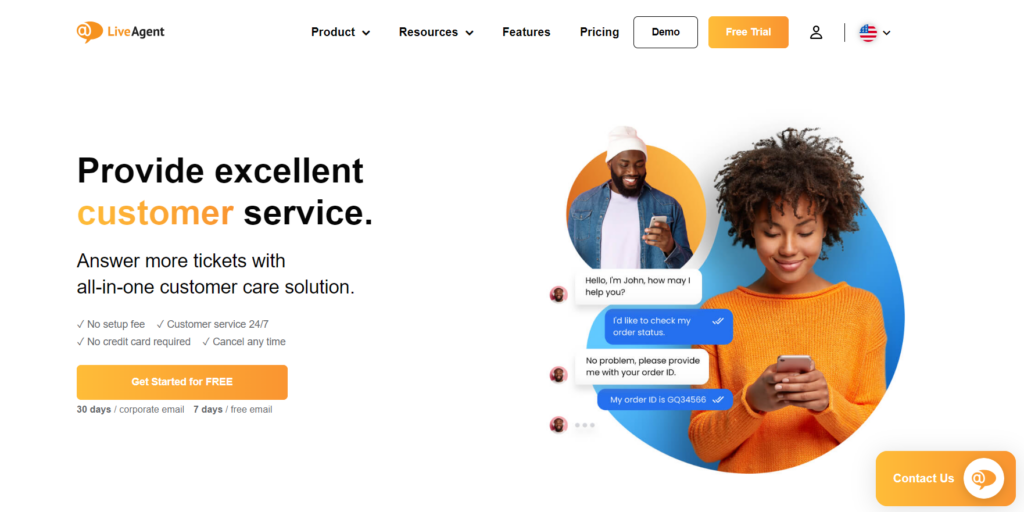
Contact center features
- Ticketing system
- Live chat
- Email ticketing
- Customer portal
- Call center capabilities
- Social media
- iOS/Android apps
- Multichannel help desk
Other key features
- Knowledge base
- Gamification
- Customer service reporting
- Customizable live chat button
- Automation and AI capabilities
Integrations
LiveAgent offers 220+ integration options. The most popular ones include
- Twilio
- WooCommerce
- Jira
- Shopify
- Slack
- Social media platforms
Pros & Cons
Pros
- The interface is intuitive and stable
- The software is very easy to set up and use
- The price is affordable
Cons
- Some advanced features available in higher pricing plans
- Tech support is available 24/7, but it is located in the EU
- SSL has to be set manually for custom domains
LiveAgent pricing
LiveAgent stands out among software providers with its user-friendly interface and contact center software platform, perfect for businesses seeking seamless customer support solutions. Try its free version or explore the full potential with a one-month trial of its powerful cloud contact center software. Flexible pricing plans ensure a perfect fit for every business: Small at $15, Medium at $29, Large at $49, and Enterprise at $69 per agent monthly.
Author’s opinion
Placed first on our list is LiveAgent, due to an easy-to-navigate interface that streamlines customer interactions. The software overall has user-friendly interface and doesn’t warrant much technical knowledge.
It offers a centralized system for tracking customer inquiries that comes with an excellent built-in ticketing system for keeping tabs on customer issues. Its live chat feature is another standout, allowing timely customer engagement. The analytics and reporting are straightforward, delivering insights to help businesses optimize their customer service.
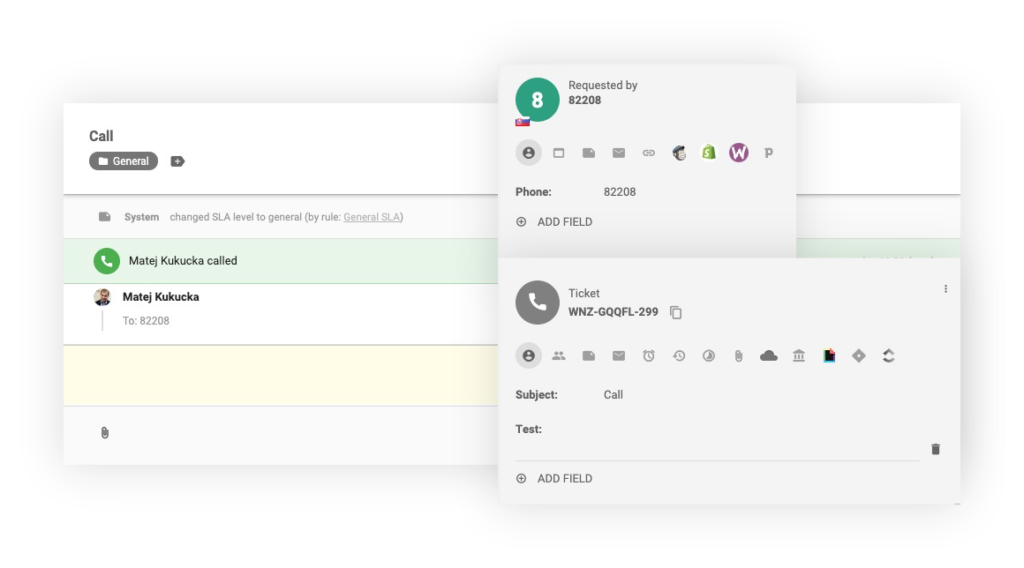
Despite its multitude of advanced features, LiveAgent could use some improvements when it comes to the mobile version. It’s not as intuitive or easy to use as its desktop counterpart, and accessing the software from a phone or tablet can be a bit tedious.
Probably the most notable benefits of LiveAgent’s solution are its scalability and customizability. You can tweak the software to fit your exact needs and customer preferences while being able to scale it up and down.
Overall, while LiveAgent stands out for its user-friendliness and range of features, improvements can be made in terms of its mobile interface. LiveAgent’s customizable and scalable nature comes as a breath of fresh air in today’s contact center landscape. While some advanced features are available at a higher cost, LiveAgent is a reliable contact center software for businesses of all sizes.
Customer review
“Their method is straightforward and easy to use, which is why our customer service teams appreciate it. Because of its adaptability and usefulness for real-time communication. It’s easy to use and runs smoothly in the background, and I appreciate the reporting options and high efficiency it provides.”
Source: Capterra
To revolutionize your contact center operations, sign up for LiveAgent’s 30-day free trial and start delivering exceptional customer experiences today!
2. Nextiva (4.6/5)
Nextiva is a cloud contact center designed to integrate voice, video calls, instant messaging, and email services. This software offers robust features like multichannel routing, automatic call distribution, and interactive voice response. Key benefits include enhanced customer experience, improved operational efficiency, and real-time reporting and analytics capabilities. Its scalability is another advantage, making it suitable for businesses of all sizes.
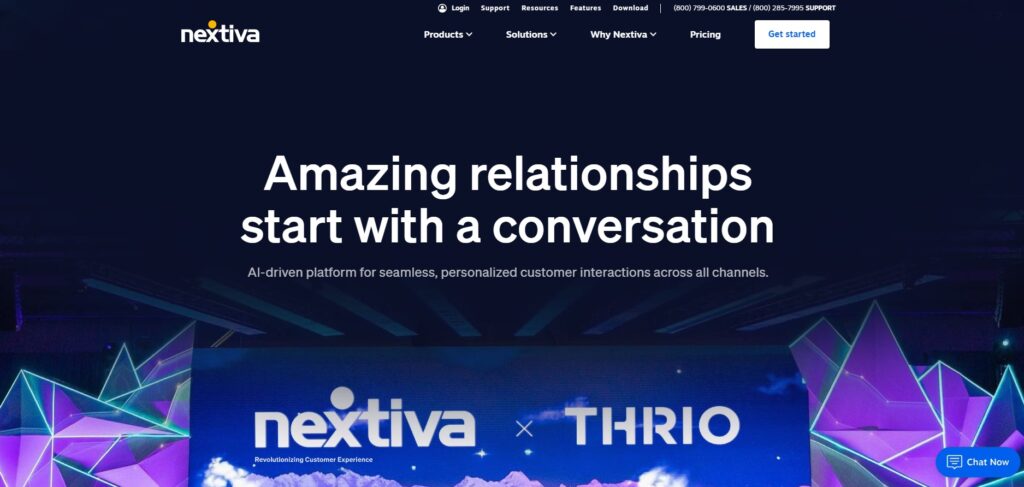
Contact center features
- Call center management
- Chat/messaging
- Live chat feature
- VoIP
- PBX
- Social media
Other key features
- Virtual Assistant
- Knowledge base
- Dashboards
- Customizable reports
- Contact management
Integrations
- Salesforce
- Bullhorn
- Lotus Notes
- ConnectWise
- NetSuite
Pros & Cons
Pros
- Intuitive and straightforward interface
- Powerful call center capabilities
- Reliable customer support
Cons
- The mobile app experiences occasional issues
- Insufficient user password management options
- Setting up the system can be a bit challenging
Nextiva pricing
The pricing for Nextiva’s Contact Center plans is available after contacting their sales team.
Author’s opinion
Nextiva’s contact center software offers a comprehensive solution for business communications with easy-to-navigate tools and functions. We have given it second place in our list due to its powerful call center features, such as call routing system for business, queuing, and interactive voice response that enhance the customer interaction experience significantly.
The interface is intuitive and simplifies managing essential tasks like scheduling and tracking performance metrics. The software’s ability to integrate smoothly with existing CRM platforms is particularly beneficial for modern contact centers.
However, the experience comes with its share of challenges as well. For instance, setting up the software for use can be quite a task even though it appears straightforward. Automatic responses set up may be overwhelming for non-tech-savvy users.
Despite its initial setup challenges, Nextiva is a versatile solution offering a user-friendly software interface that can be useful for any business.
3. CloudTalk (4.4/5)
CloudTalk is a contact center software that delivers an array of services aimed at streamlining customer support and sales team performance. It offers the ability to manage inbound call centers, scalability for growing businesses, and enhanced call-handling capabilities.
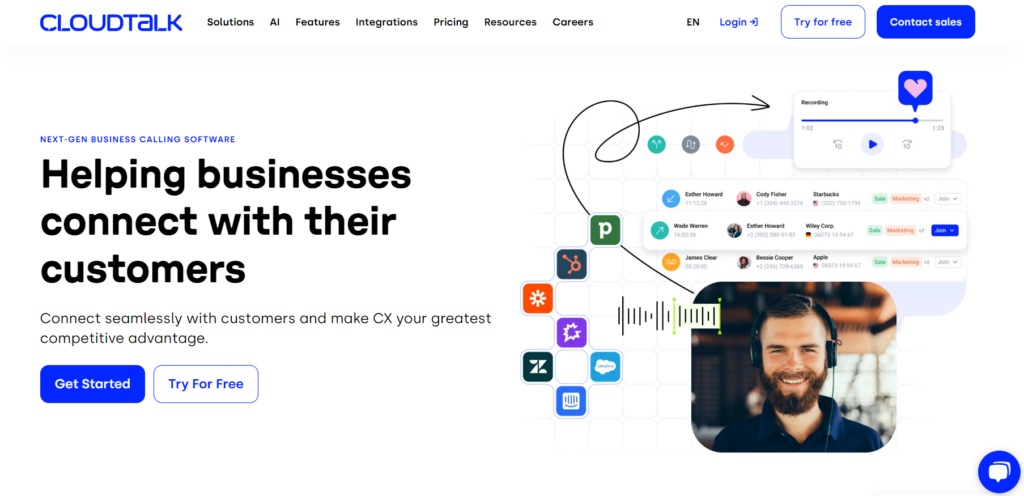
Contact center features
- Call center capabilities
- SMS
Other key features
- Power dialer
- Unlimited concurrent calls
- Skill-based routing
- Workflow automation
- Real-time dashboards
- AI Call Transcription
Integrations
- Pipedrive
- Salesforce
- BigCommerce
- Slack
- Nicereply
Pros & Cons
Pros
- The interface is easy to navigate
- Reliable mobile app
- It offers great call quality
Cons
- Occasional delayed responses from customer support
- No option to send MMS in Europe
- Occasional crashes during high-volume times
CloudTalk pricing
You can purchase CloudTalk’s software in the following pricing options: Starter for $25 per user/month, billed annually, Essential for $30 per user/month, billed annually, Expert for $50 per user/month, billed annually, and Custom with a tailored subscription.
Besides these, CloudTalk offers a 14-day free trial, so you can get acquainted with the system before making a purchase.
Author’s opinion
CloudTalk provides impressive features perfect for businesses managing extensive customer interactions. It has earned the third place in our list, thanks to its user-friendly and intuitive interface that requires little to no technical expertise to understand.
Its robust set of functionalities, including call recording, and monitoring, are comprehensive and efficient in managing customer relationships. CloudTalk’s automated workflow and advanced analytics enhance the customer service experience by streamlining critical customer service processes and providing insights into relevant customer interactions.
However, the software occasionally faces instability, with crashes during high-volume times, which can impact service efficiency.
CloudTalk is a commendable contact center software with impressive features that enhance customer relationship management. However, it would significantly benefit from stability improvement and better customer service.
4. Dialpad (4.3/5)
Dialpad is a cloud-based platform designed to simplify and enhance customer service operations for businesses. Dialpad enables streamlined communication across various channels, contributing to improved customer experience.
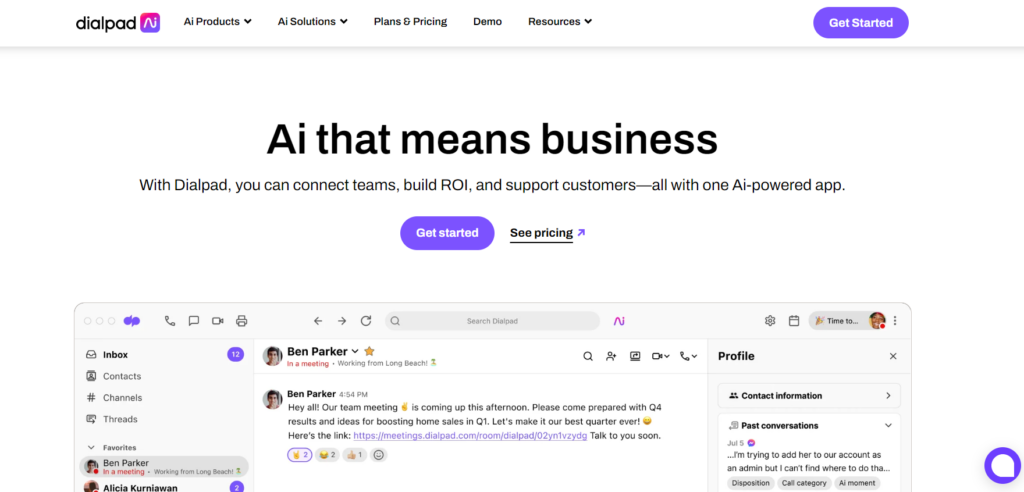
Contact center features
- Voice channels
- Video channels
- Business text messaging
- Social media
- Chatbots
Other key features
- Automatic call distributor
- Real-time assist
- Call recording
- Auto attendant
- Screen sharing
- Analytics
Integrations
- Slack
- Rippling
- Miro
- Okta
- Salesmate
Pros & Cons
Pros
- Responsive customer support team
- The software is easy to use
- Continuous improvement of the software
Cons
- Limited reporting capabilities
- Occasional issues with call back
- The price may be too high for smaller businesses
Dialpad pricing
Dialpad’s contact center capabilities come with three pricing options. The first, Essential tier costs $80 per user/month. The second tier, Advanced, costs $115 per user/month, and the last Premium plan costs $150 per user/month. All of these are billed annually.
You can give Dialpad a test drive during a 14-day free trial.
Author’s opinion
Dialpad provides a well-balanced combination of efficient user interfaces, a host of features, and seamless integration capability. That is why it has been ranked number four on our list.
The software excels in integrating with multiple platforms, enhancing collaboration and simplifying workflows. Its AI-driven voice intelligence, including sentiment analysis and transcription, improves customer service. With Cloud solutions and Contact Center AI, it’s ideal for remote agents.
However, Dialpad’s mobile app lags behind the desktop version in functionality and ease of use, with issues like dropped calls and poor audio quality. Additionally, the basic reporting and analytics tools lack the detailed insights needed for efficient contact center operations, as highlighted in user reviews.
Overall, while Dialpad provides a commendable communication tool, it could still benefit from updates in certain aspects. Nonetheless, according to user reviews, it’s a useful platform for establishing an effective communication system for various organizations.
5. Talkdesk (4.6/5)
Talkdesk is cloud contact center software designed to assist businesses in enhancing customer engagement and satisfaction. It leverages sophisticated artificial intelligence and machine learning technology, customizable telephony connections, and easy system integration.
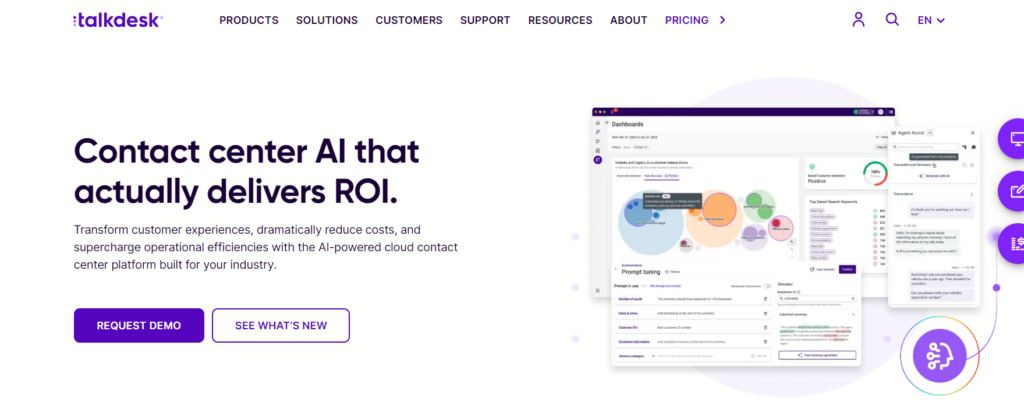
Contact center features
- Call center capabilities
- SMS
- Chat
- Social media
- Ticketing system
Other key features
- Voicemail transcription
- Automatic call distributor (ACD)
- Automated workflows
- Call monitoring
- Real-time dashboards
- Local caller ID
Integrations
- Shopify
- Pipedrive
- Olark
- Slack
- Salesforce
Pros & Cons
Pros
- Great call quality
- The software is very reliable and stable
- The customer support is reliable and knowledgeable
Cons
- Insufficient reporting capabilities
- Missing search function for calls
- The pricing can be too high for small businesses
Talkdesk pricing
If you would like to purchase Talkdesk’s solution, you can choose from four pricing packages. Talkdesk’s cheapest plans, CX Cloud Digital Essentials and CX Cloud Essentials come up to $85 per user/month. The CX Cloud Elevate pricing tier costs $115 per user/month, and the most expensive, CX Cloud Elite comes up to $145 per user/month.
Talkdesk doesn’t offer a free trial.
Author’s opinion
We have placed Talkdesk in fifth place because it provides an intuitive platform and a robust cloud-based system with an accessible interface, quick setup, and numerous integrations with external platforms, making it a functional tool in our daily operations. Its omnichannel functionality connects with customers across various digital channels, ensuring a unified customer experience management. Advanced routing and predictive analytics further enhance customer service operations, allowing contact center agents to offer relevant customer interactions, improving customer service and satisfaction.
However, while Talkdesk boasts many benefits, it’s not without its shortcomings. Deciphering some of the analytics and reports can be challenging, as the dashboard can be complex and difficult to navigate. The high-quality features come at a price, making it less accessible for smaller companies or startups looking for a customizable solution with a better return on investment.
Overall, despite areas that need refining, Talkdesk’s comprehensive suite and advanced features make it a worthwhile consideration for businesses requiring inbound call center software to meet customer preferences and deliver a seamless experience.
6. Five9 (4.3/5)
Five9 provides customer service solutions across various communication channels including phone, email, chat, and social media. Five9 empowers remote work as it can be accessed anywhere with an internet connection.
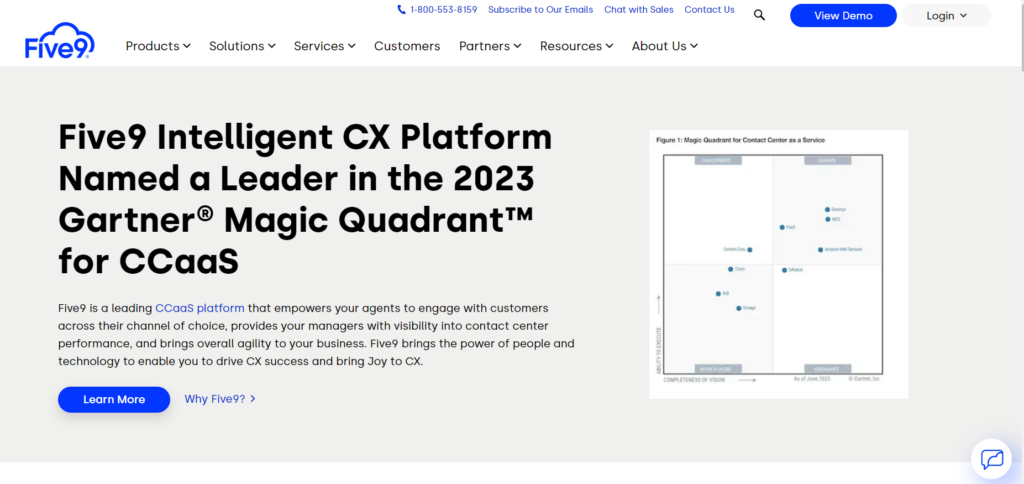
Contact center features
- Inbound calls
- Outbound calling
- Call conferencing
- Social media
Other key features
- Reporting and analytics
- Workforce management tools
- Intelligent virtual agents feature
- AI insights
- Gamification
Integrations
- Customer relationship management integrations
- Salesforce
- Oracle
- ServiceNow
Pros & Cons
Pros
- Intuitive user interface
- Reliable call center software
- The initial setup process is easy and straightforward
Cons
- Insufficient reporting capabilities
- Missing search function for calls
- The pricing can be too high for small businesses
Five9 pricing
Five9 provides services in five distinct bundles. The Digital plan and Core tier are both priced at $175/month, while the Premium package is available for $235/month. The Optimum tier is offered at $290/month, and the Ultimate tier is priced at $325/month.
Author’s opinion
Five9 is a fairly robust contact center software that I’ve found to be versatile in managing customer interactions. It notably supports omnichannel communication such as phone, email, chat, and social media – a feature that streamlined our service delivery immensely. The integration with popular CRM platforms is also a plus, as it aided in automating several customer service-related tasks, saving time and reducing errors.
On the positive side, the user interface is comprehensive and relatively easy to navigate after some training. The software is also cloud-based, making accessibility seamless from different devices, and the system’s predictive dialer robust feature enhanced productivity levels in our outbound call campaigns.
However, Five9 comes with a few drawbacks. At times, the call quality can be unpredictable, with instances of dropped calls or voice lags. The customer support, unfortunately, was sometimes slow to respond, and this negatively affected problem resolution times.
Overall, while Five9 contact center software has its fair share of downsides, it possesses features that can significantly contribute to the quality of customer interactions.
7. Zendesk (4.4/5)
Zendesk is an advanced contact center software that aids businesses in enhancing their customer service operations. Its user-friendly interface and scalability make it suitable for businesses of varying sizes.
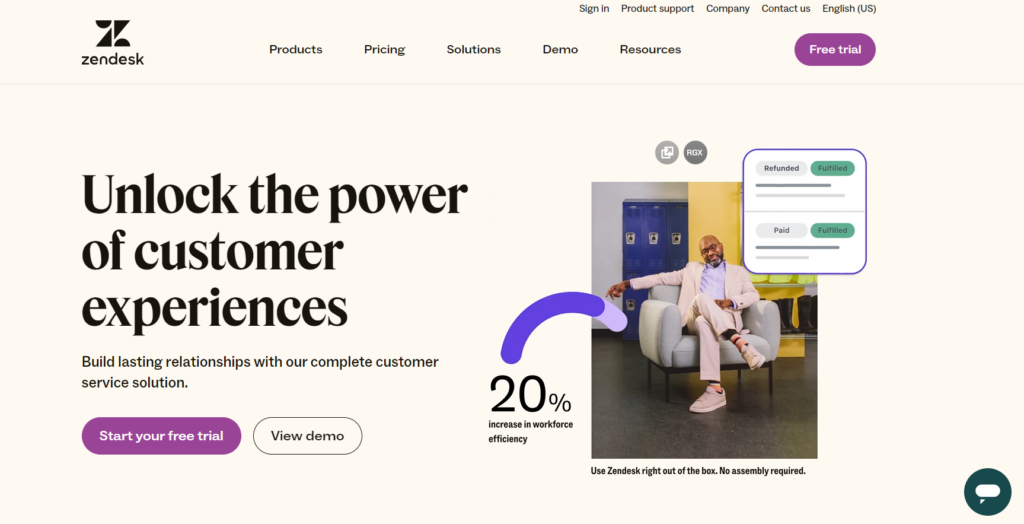
Contact center features
- Ticketing system
- Live chat
- Email management
- Social media messaging
- Call center capabilities
Other key features
- Advanced analytics
- Custom business rules
- Knowledge base
- Customer satisfaction ratings
- AI-powered content rules
Integrations
- Slack
- Harvestr
- Salesforce
- Trello
Pros & Cons
Pros
- The user interface is user-friendly and accessible
- Over 100 third-party integrations
- Robust knowledge base and self-service options
Cons
- Insufficient customer support
- Steep learning curve
- Occasional difficulties with uploading and exporting data
Zendesk pricing
The charge for the Support Team bundle is €19 per representative monthly. The Suite Team bundle has a price of €55 per representative each month, while the Suite Growth bundle is available at €89 per representative every month, and the Suite Professional bundle costs €115 per representative each month. For the premium Enterprise plan, getting a detailed quote from the sales team at Zendesk is necessary.
Before deciding on a paid subscription, you can take advantage of Zendesk’s two-week complimentary trial.
Author’s opinion
Zendesk’s contact center software is a formidable customer service solution. It effectively brings all customer interactions spanning various communication channels such as email, social media, phone, and live chat under one interface. The user-friendly design is also worth noting; not to mention the rich ticket management features it offers – easy assignment, tracking, and prioritization.
However, there are a few low spots to think about. The customization options are limited and might not meet the specific needs of businesses. Zendesk’s pricing structure is another disadvantage. While offering a decent array of features, it’s more expensive compared to similar software on the market. Of course, we have to mention that Zendesk’s customer support isn’t particularly helpful.
All in all, Zendesk is a solid choice for companies looking for robust, comprehensive customer service software. However, be prepared to look for an alternative to Zendesk if the learning curve seems steep and doesn’t fit your budget.
8. Webex (4.4/5)
Webex contact center is a comprehensive cloud-based solution for customer interaction and management platform. It provides advanced AI and data analytics capabilities to deliver personalized customer experiences. Users appreciate Webex’s easy integrations with other business tools.
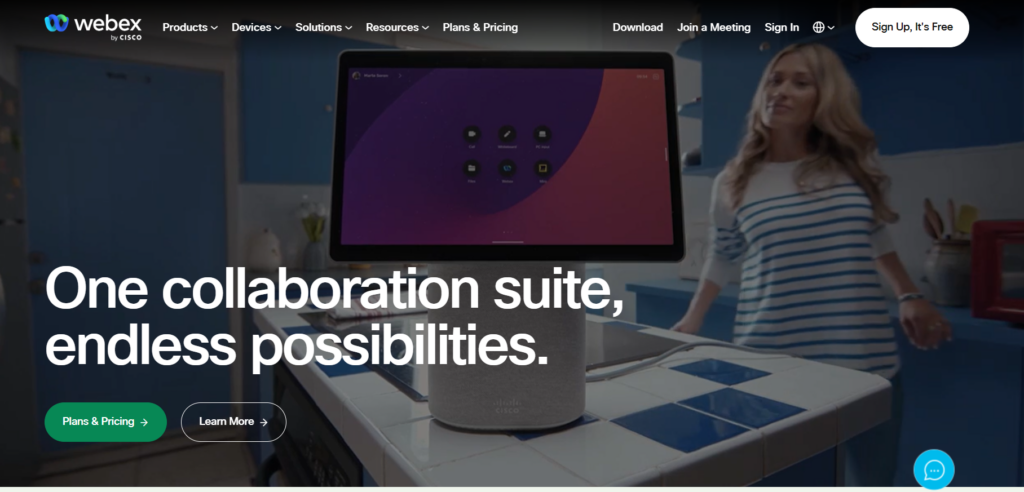
Contact center features
- Advanced meeting capabilities
- Team chat messaging
Other key features
- Meetings on the go
- Call forwarding
- Voice commands and keywords
- Call recording
- End-to-End Encryption
Integrations
- Trello
- Moyobi
- Asana
- Billsby
Pros & Cons
Pros
- It offers many reliable integrations
- The software is easy to navigate once set up
- Offers a wide range of conferencing features
Cons
- Occasional audio driver problems
- When there are >20 participants, it can be resource-intensive
- Occasional sync issues between desktop and mobile apps
Webex pricing
Webex contact center offers two main suites that include multiple pricing packages.
In the Meeting suite, there are four main pricing tiers: Webex Free is free of charge, Webex Starter costs £114 per license/year, Webex Business £162 per license/year, and Webex Enterprise offers custom pricing.
In the Webinars & Events suite, Webex offers two packages: Webex Webinars and Webex Events. Both come with custom pricing.
Author’s opinion
Webex is a powerful tool that effectively manages customer and team interactions. Its prominent feature, the multichannel engagement eases customer interactions by consolidating calls, emails, and social media inquiries into one interface.
Despite the majority of its beautifully crafted features, the Webex contact center suffers a few setbacks. First, the configuration setup of Webex contact center is quite technical. It may pose a challenge to non-tech-savvy users during the initial setup.
In terms of user experience, during peak periods, the software occasionally becomes slow, leading to longer wait times for customers.
To conclude, Webex has impressive qualities for those, looking for intelligent cloud-based contact center software for customer relationship management. While there are drawbacks, with slight adjustments and improvements, this single platform can easily be a game changer for many businesses.
9. RingCentral (4.3/5)
RingCentral is a cloud-based solution offering comprehensive contact center technologies for managing customer interactions. It helps enhance customer service experiences, improve agent productivity, and streamline workflow.
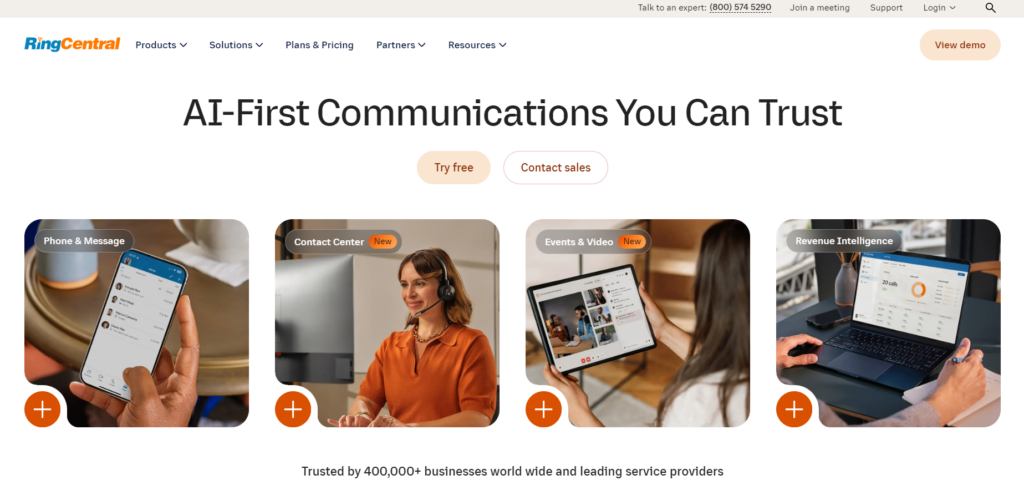
Contact center features
- Call center capabilities
- Multi-level auto attendant and IVR
- Team messaging
- Video meetings
- Visual voicemail
Other key features
- AI-noise cancellation
- Advanced call monitoring
- Cost center management
- Real-time quality-of-service analytics and alerts
- Single sign-on
Integrations
- Slack
- Salesforce
- VMWare
- Canvas
Pros & Cons
Pros
- It is very configurable for many use cases
- The software is reliable without many downtimes
- It offers great call quality
Cons
- Insufficient customer support
- Sometimes it is difficult to integrate with other systems
- Lacking batch messaging
RingCentral pricing
RingCentral’s Phone System suite has three primary pricing plans. The Core package is priced at $20 per user per month when billed annually. The mid-tier, Advanced package, comes in at $25 per user per month when paid on an annual basis. The highest level, the Ultra tier, is available for $35 per user per month, again with an annual payment plan. Besides, RingCentral’s Contact Center suite provides RingCX powered by RingSense AI, at a starting rate of $65 per agent per month, to be paid annually. Furthermore, an elite-tier RingCentral Contact Center Enterprise plan is available with a flexible, tailor-made pricing structure.
RingCentral lets you test out their offerings during a 14-day free trial.
Author’s opinion
RingCentral works effectively for managing calls, emails, social media, and other customer interaction data. It presents the business analytics clearly and concisely allowing easy access to key customer intelligence.
However, it is not without its flaws. The user interface, while accessible to non-technical users, could benefit from improved aesthetic appeal to better support customer service teams managing outbound campaigns. Additionally, the setup process can feel intensive, particularly without clear guidance, which may add to the upfront costs for some organizations. While their customer service is generally reliable, there were instances where I experienced longer-than-expected response times.
RingCentral is a powerful contact center platform with a robust set of features, efficient reporting tools, and seamless CRM integration. Nevertheless, room exists for increasing responsiveness in customer support, simplifying the learning curve, and making the pricing model more small-business-friendly.
10. Nice CXone (4.2/5)
Nice CXone is a comprehensive platform for customer service operations. This software distinguishes itself with features like personalized customer engagement, predictive intelligent routing, and real-time data visualization.
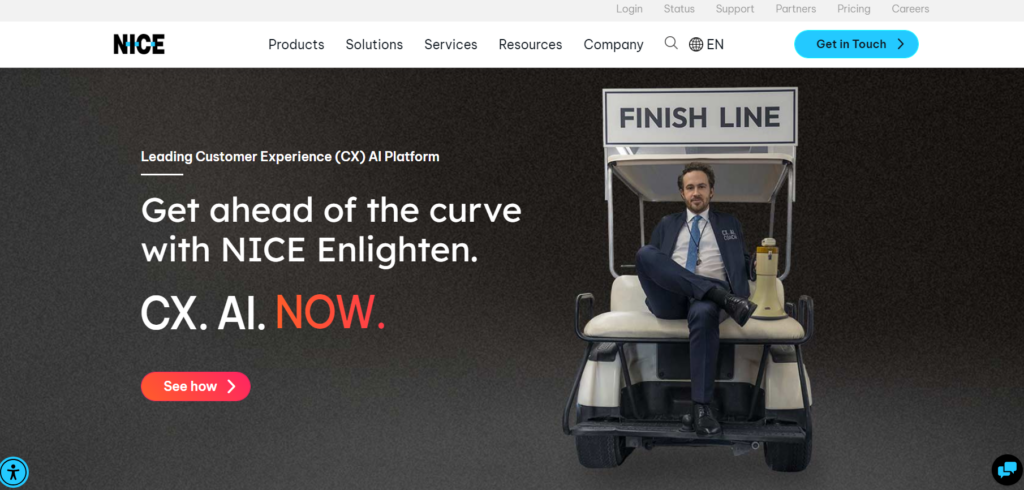
Contact center features
- Live chat
- Call center capabilities
- Emailing
Other key features
- AI features
- Analytics
- IVR
- Speech analytics
- Auto dialer
Integrations
- Salesforce
- SugarCRM
- NetSuite
- Oracle service cloud
Pros & Cons
Pros
- The software offers many customization options
- Reliable calling features
- The solution is easy to use
Cons
- The initial setup can be difficult
- Crashes may occasionally occur
- Limited reporting features
Nice CXone pricing
Nice CXone offers their customer base two main pricing suits: Interactions Orchestration and Orchestration, Optimization and Analytics.
The first option includes three pricing tiers. The cheapest, Digital Agent costs $71 /month, the second tier, Voice Agent costs $94 /month, and the last, Omnichannel Agent comes up to $110 /month.
Another three pricing plans are included in the Orchestration, Optimization and Analytics suite. The Essential Suite will cost you $135 /month. The second tier, Core Suite costs $169 /month, and the last, Complete Suite costs $209 /month.
You can experience the software for free for 60 days during a free trial.
Author’s opinion
Nice CXone streamlines the customer experience with integrated services such as voice, email, and chat support of qualified agents, delivering seamless customer interactions. Additionally, advanced analytics is a game-changer, offering real-time insights that significantly boost the decision-making process. On the ease of use front, the software’s intuitive interface facilitates employee training and enhances productivity.
However, the software comes with some drawbacks. The initial setup can be overwhelming due to its rich functionalities, especially for teams transitioning to cloud-based contact center software like Service Cloud or GoTo Connect. This steep learning curve can create logistical challenges for those new to the platform. Additionally, while the integration of predictive analytics is a valuable feature, occasional performance lags during peak usage times can impair workflows and require timely resolution. Lastly, the customer support could benefit from faster response times and improved issue resolution to better support users.
Despite these cons, Nice CXone remains a robust and efficient tool for customer interaction and support. It effectively bridges the gap between businesses and their customers, fostering relationships and promoting customer satisfaction and loyalty.
11. 8×8 (4.1/5)
8×8 is a comprehensive platform for customer service operations. This software distinguishes itself with features like personalized service, predictive behavioral routing, and real-time data visualization.
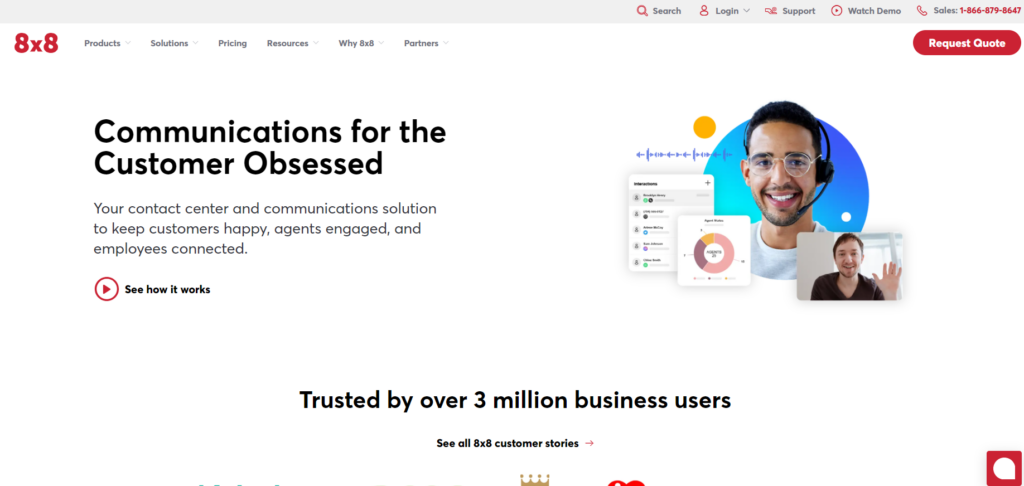
Contact center features
- Voice calling
- Team messaging with document sharing
- Intelligent interactive voice response (IIVR)
- SMS and MMS
- Social media
- Messaging apps
Other key features
- Skills-based routing
- Call handling
- Predictive dialer
- Contact center reporting and analytics
- Voicemail with transcription
Integrations
- Pipedrive
- Okta
- Salesforce
- Copper
Pros & Cons
Pros
- Reliable mobile app
- The software is easy to use
- Convenient notifications
Cons
- The performance can be a little clunky
- Onboarding can be challenging
- Customer support often lacks technical expertise
8×8 pricing
8×8 offers five pricing plans: X2, X4, X6, X7, and X8. To request a quote, contact 8×8’s sales representatives.
Before committing to a paid plan, you can test 8×8 during a 30-day free trial.
Author’s opinion
8×8 blends well with the modern demands of client contact services. It offers distinct features such as multichannel smart routing, interactive voice response, and real-time monitoring, which are crucial for successful customer service. The software’s flexibility and adaptability allow it to be customizable to specific business needs.
However, the software comes with some drawbacks. The initial setup can be overwhelming due to its rich functionalities, which is a common challenge with modern contact center software platforms like Service Cloud and GoTo Connect. Despite being a leading cloud contact center software provider, its user-friendly interface could still use refinement to ensure improved customer service. Additionally, occasional performance lags during peak usage times can disrupt workflows and require prompt attention to maintain efficiency.
12. Bright Pattern (4.8/5)
Bright Pattern is a contact center software solution designed to simplify omnichannel customer service interactions. Among its advantages are scalability, easy integrations with CRM systems, and real-time analytics. Its capability to provide seamless customer interactions across various channels gives businesses a competitive edge in enhancing customer experience.
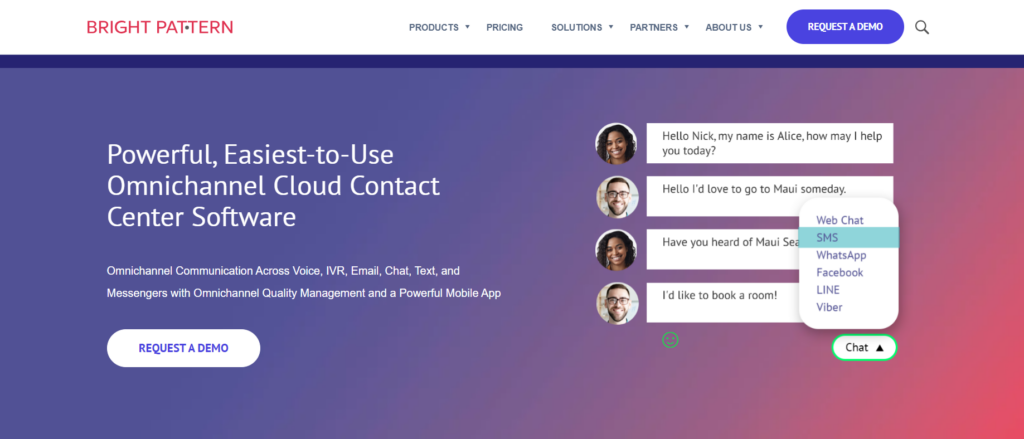
Contact center features
- Inbound and outbound calls communications
- SMS / MMS
- Web chat
- Emailing
- Social messengers
- Video chat
Other key features
- Workflow automation
- Answering machine detection
- Customizable wallboard
- Knowledge sharing
- Natural language processing
Integrations
- Salesforce
- IBM Watson
- Forgerock
- PostgreSQL
Pros & Cons
Pros
- The software is being continuously improved
- Reliable and knowledgeable customer support
- The solution is very easy to use
Cons
- Missing notifications before making changes or updates
- Lacking flexibility in email routing
- Limited quality management for assessing interactions
Bright Pattern pricing
Bright Pattern offers the following pricing packages: Call Center Standard, Digital CX, Omnichannel CX, Bright Pattern Mobile. To learn about the prices of these plans, contact Bright Pattern’s team.
You can give Bright Pattern a test drive, before purchasing the tool during a free trial.
Author’s opinion
Bright Pattern contact center software offers a robust and scalable solution for handling customer interactions across multiple channels. The intuitive user interface is a stand-out feature, allowing easy navigation and usage even for less tech-savvy customers. The real-time monitoring and reporting features also provide a comprehensive view of contact center performance, all-in-one customer experience management platform.
However, the software isn’t without its downsides. There is a steep learning curve, particularly without proper training, which may impact team productivity initially. The reporting feature, though comprehensive, can seem overly complex to a new user or to those not used to data analysis. This can delay retrieving necessary information or making quick, data-driven decisions.
Although Bright Pattern is slightly complex to understand initially, it proves to be an effective tool for maintaining a well-organized contact center once you get the hang of it. With its wide range of features and integration capability, it truly stands out from many competitor systems, allowing a seamless customer service experience.
How to choose the right contact center software for your business?
Choosing the right contact center software is a critical decision for any business that needs to provide efficient and high-quality customer service. This step-by-step guide will streamline the process, providing you with a clear path to making your decision.
Step 1: Define your business requirements
The first step is to identify what you need from a contact center solution. It should align with your business goals and requirements. Ask yourself these questions:
- What are our customer support objectives?
- What communication channels (phone, email, live chat, social media) do our customers prefer?
- Do we need integration with other business applications (like CRM systems)?
- What is our budget for contact center software?
Step 2: Evaluate features and functionality
Different software have different sets of features. Consider the following to determine which ones are vital for your business:
- Does the software support all the channels that our customers use?
- Does it have an easy-to-use interface that our staff can learn quickly?
- Does it offer reporting and analytics functionality to measure our performance?
- Can it scale as our business grows?
- Does it offer automation features to reduce repetitive tasks?
Step 3: Check vendor credibility
It’s crucial to choose a reputable vendor for your contact center software. Ask these questions:
- Does the contact center provider have a proven track record in supplying successful contact center software?
- Does their solution cater to businesses of our size and in our industry?
- Are they responsive to customer inquiries?
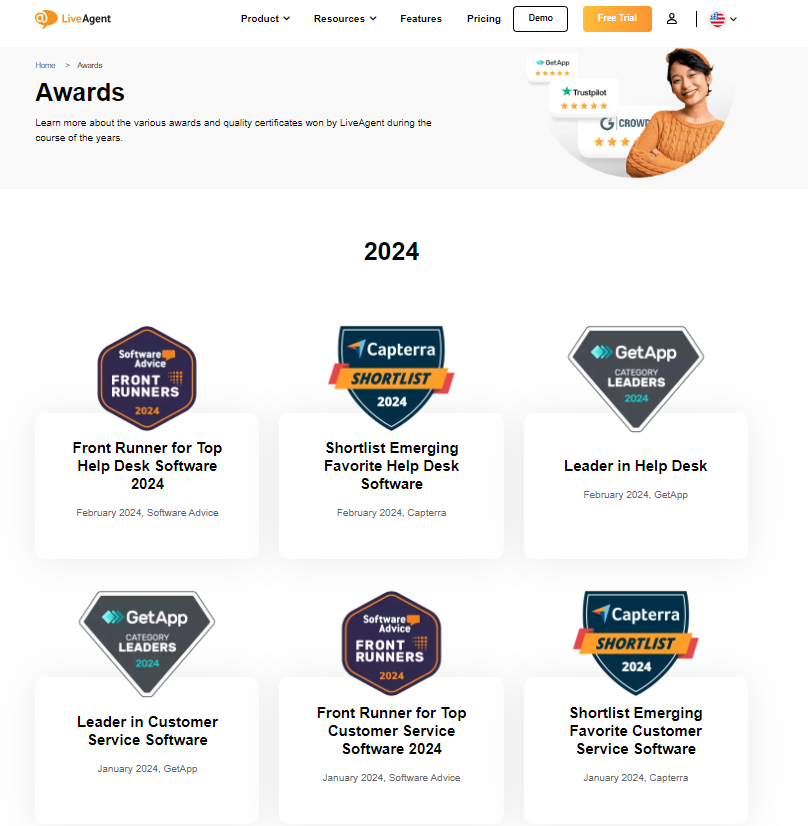
Step 4: Consider the cost
Cost is always a significant factor. However, don’t just look at the initial price. Consider the total cost of ownership, as well. Here are some questions to consider:
- What is the initial cost of the software?
- What are the costs for additional features or upgrades?
- Are there any hidden costs, like installation, training, maintenance, or support fees?
- Does the vendor offer a flexible pricing model, such as pay-as-you-go or subscription-based?
Step 5: Test the software
Most contact center providers offer free trials or demos of their software. This is your opportunity to test and see if the software suits your business needs. Look for the following:
- Is the user interface intuitive and easy to navigate?
- How do the features and functionalities work in practice?
- How does the software perform under high usage or stress?
- Is the customer support prompt and helpful during the trial?
Step 6: Gather feedback
If possible, gather feedback from other companies using the software. Here’s what you should ask for:
- How has their experience been with the software in terms of functionality and ease of use?
- Have they observed any significant downtimes or glitches in the software?
- Overall, are they satisfied with the software and the vendor?
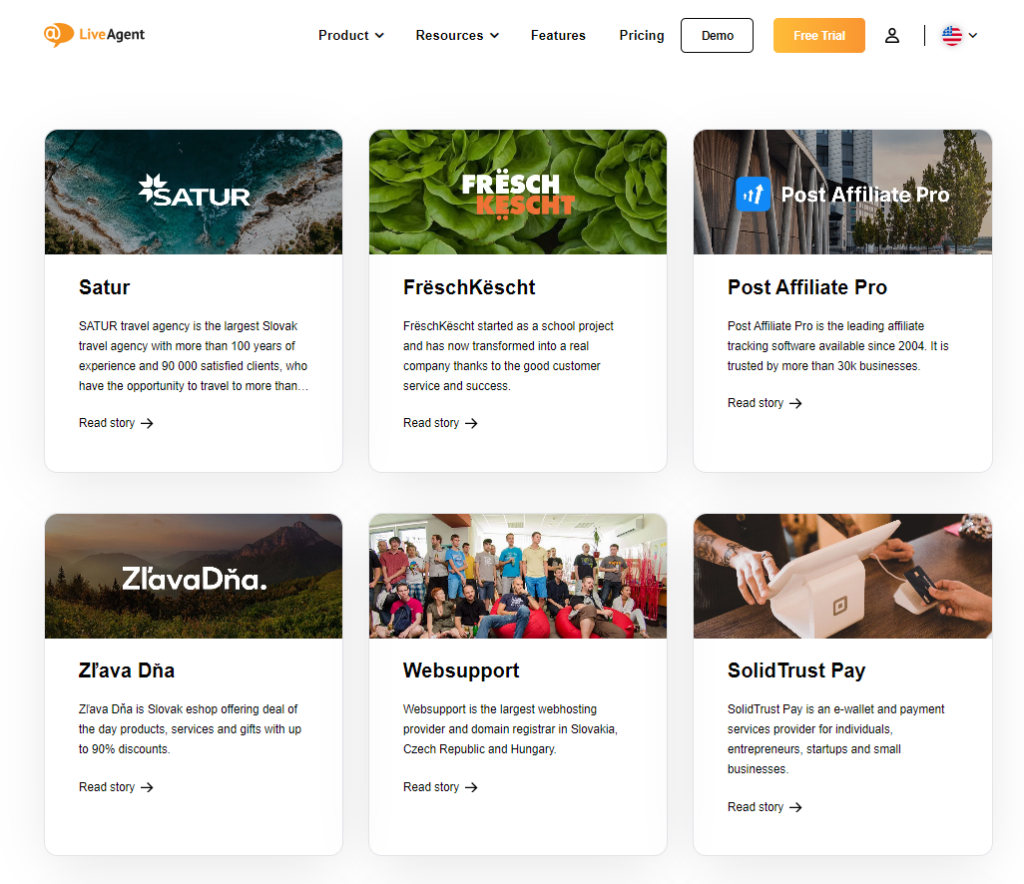
Step 7: Make the decision
Based on your analysis and feedback gathered, decide on which contact center software is the best fit for your business. The right software should meet your present requirements and be capable of accommodating future growth. Be sure to consider all the aspects — functionality, vendor reputation, cost, and user feedback before making the final decision.
7 must-have features of the contact center software
Let’s look at 7 essential features your contact center needs to best support your customers.
Multichannel support
This feature allows you to access all customer interactions across email, live chat, phone, and other channels in a single streamlined view. LiveAgent does this effectively, allowing your contact center to provide seamless customer service.
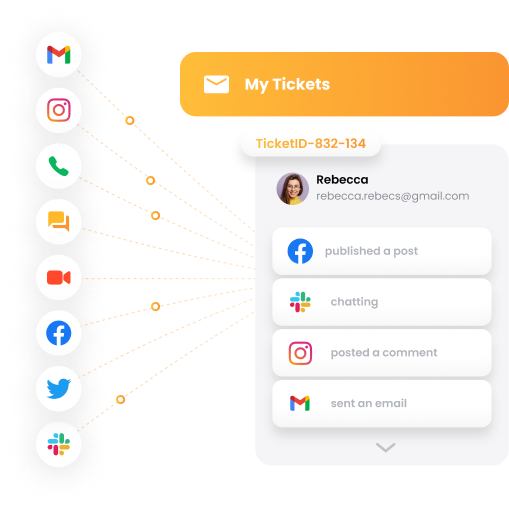
Ticket management
A ticket management system is essential in helping businesses prioritize, label, and categorize issues systematically, which leads to more efficient problem-solving and shorter response times. Without it, managing customer inquiries could feel like an uphill battle, making it harder to maintain satisfied customers and deliver timely resolutions.
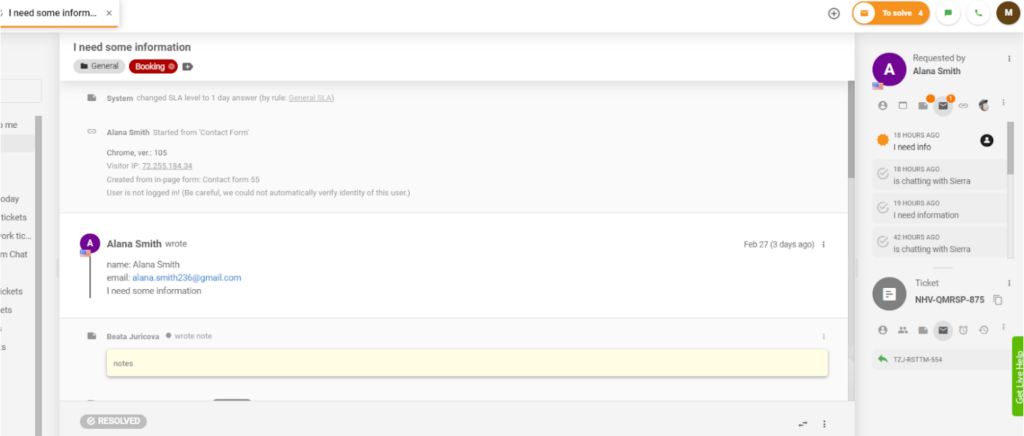
Knowledge base/customer portal
This is a comprehensive, searchable online database of information and resources. Contact centers often offer both internal and external knowledge base options. LiveAgent includes an integrated knowledge base that allows customers to seek out solutions 24/7, which reduces the workload for your support team.
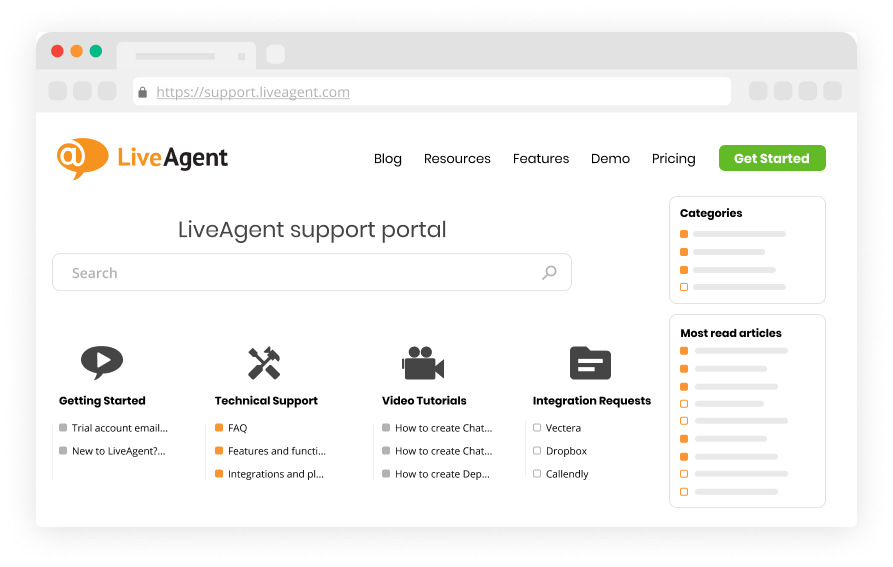
Live chat
Live chat is an essential part of any reliable contact center software because of its ease of use and immediacy of customer interactions. LiveAgent’s built-in live chat software allows real-time engagement with customers, helping to boost sales and satisfaction rates. It provides features like proactive chat invitations and chat buttons that can be added to websites or emails.
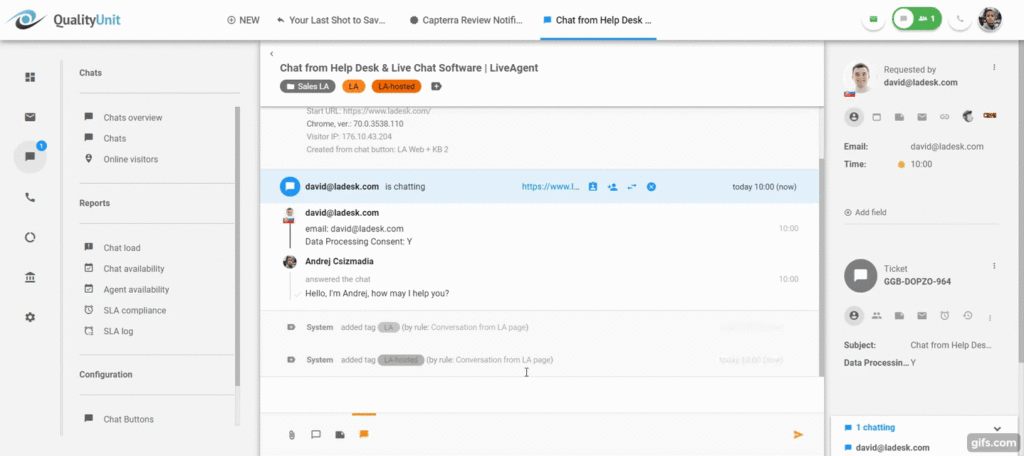
Social media integration
Many customers prefer communicating with brands using social media. LiveAgent supports integration with the most popular social media platforms like Instagram, Facebook, Viber, and X (Twitter), allowing businesses to manage social interactions as part of their customer service strategy.
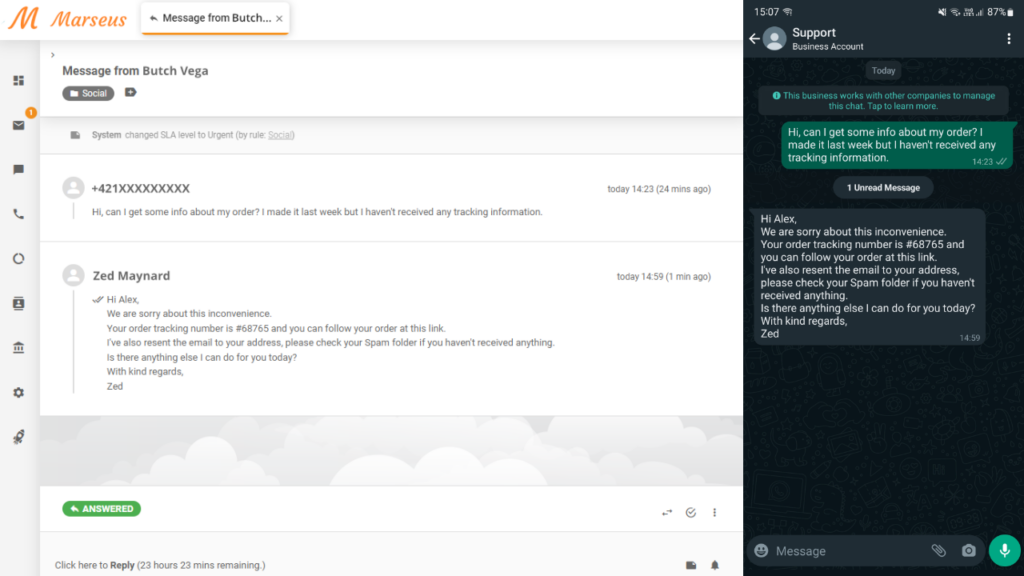
Automation & rules
Automation can save your contact center agents a lot of time otherwise spent on menial tasks. This allows for better performance leading to improved customer satisfaction. LiveAgent offers rule-based ticket distribution and comprehensive automation features that help save huge amounts of time by automating routine tasks like tagging or routing tickets to a specific department.
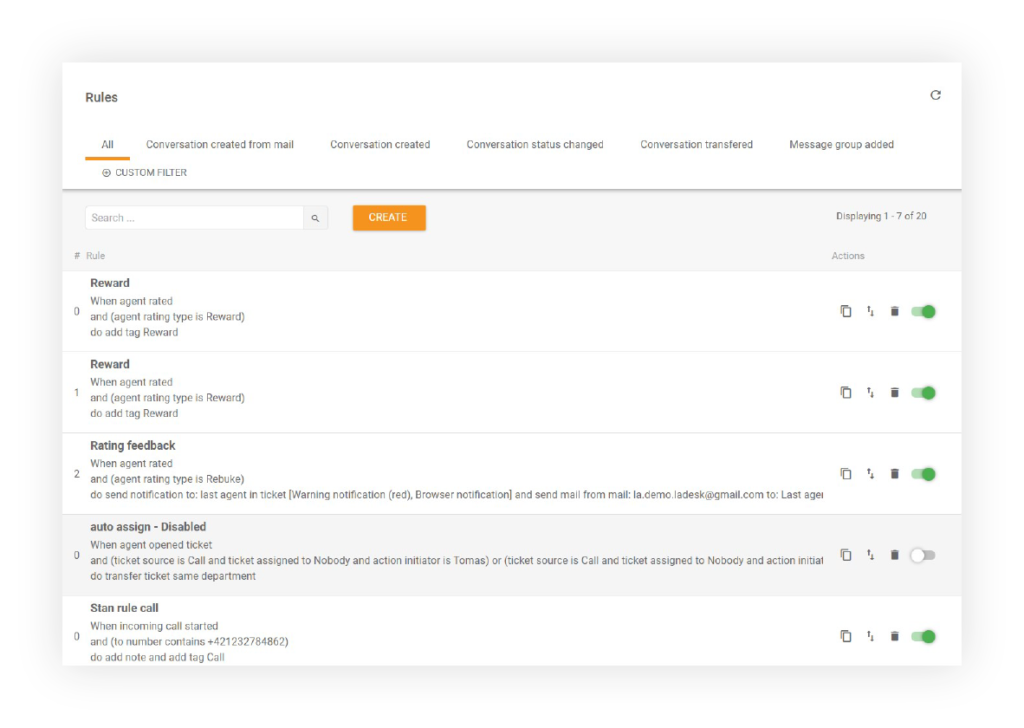
Reports & analytics
Reporting and analytics are essential for making data-driven business decisions. LiveAgent’s software comes with robust reporting and analytics features to track various aspects of contact center performance. This gives management the necessary insights to optimize their service and operations.
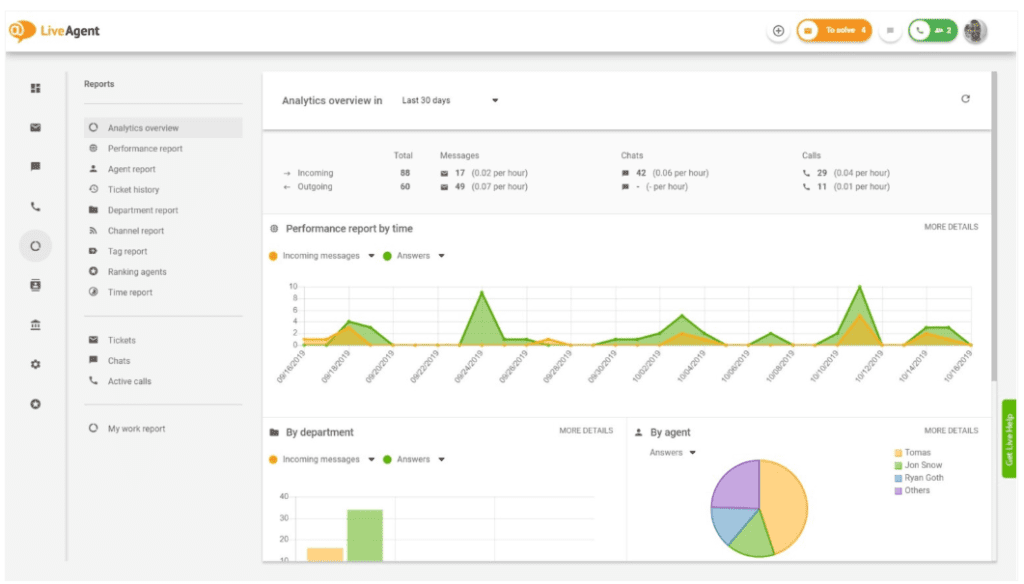
How can your business profit from contact center software?
Let’s take a look at a few ways in which your business will benefit from using a contact center.
Provide multichannel support with integration capabilities
Deploying a contact center software that supports multichannel communications and readily integrates with your existing systems grants your team the flexibility to engage customers through each one’s communication channel of choice. It allows you to maintain consistent messaging and offer seamless customer service over the phone, email, social media, live chat, and more.
Improve customer experience
With contact center software, you can streamline the communication process, reduce response time, and eliminate errors, enhancing the overall customer experience.
Features such as smart automation, AI-powered chatbots, and integrated ticketing systems can significantly improve customer satisfaction and loyalty.
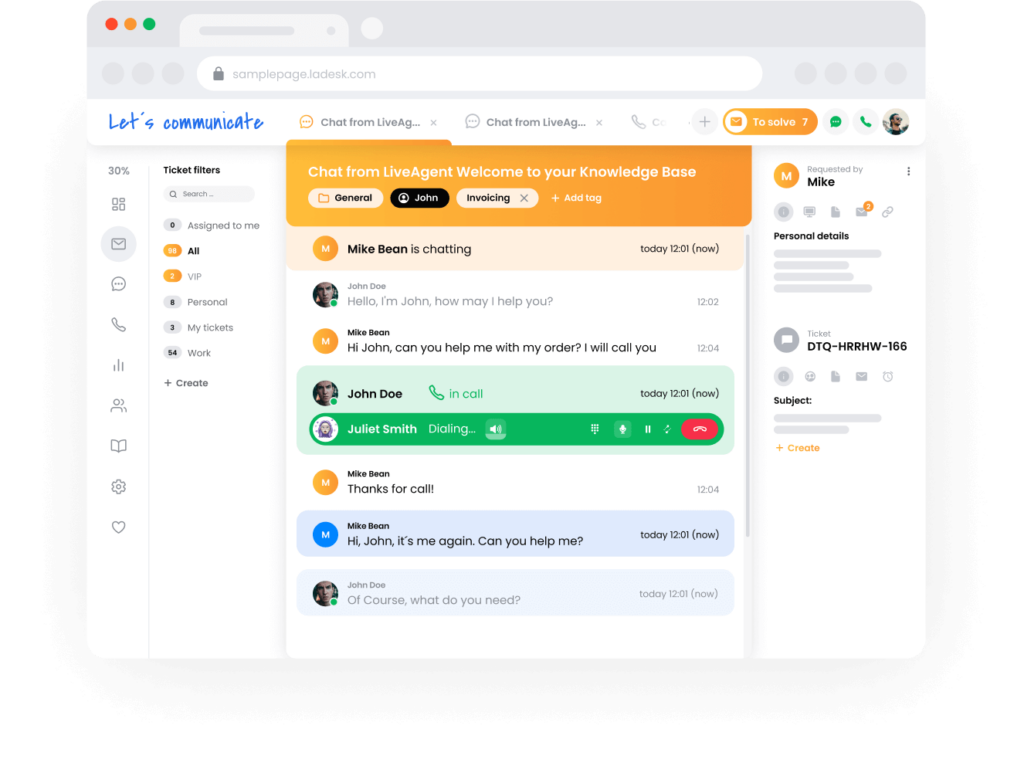
Save costs and increase sales
Contact center software can help you save business costs by automating routine tasks and reducing the need for a large in-house team. Furthermore, with improved customer interaction and issue resolution, you can expect a higher opportunity for cross-selling and upselling, improving your bottom line.
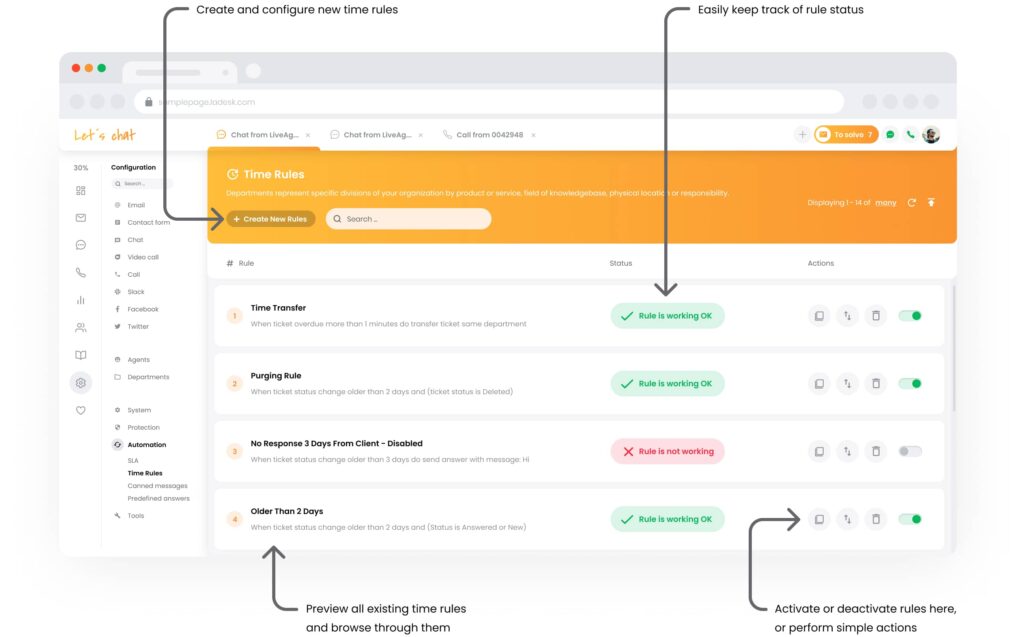
Increase your team productivity with skill-based routing
Skill-based and intelligent call routing is a feature that will direct customer calls or inquiries to the agent most qualified to handle them. This minimizes handling time, boosts first contact resolution rates, and reduces the need for transfers or call-backs. In turn, this revs up efficient ticket management and your team’s productivity.
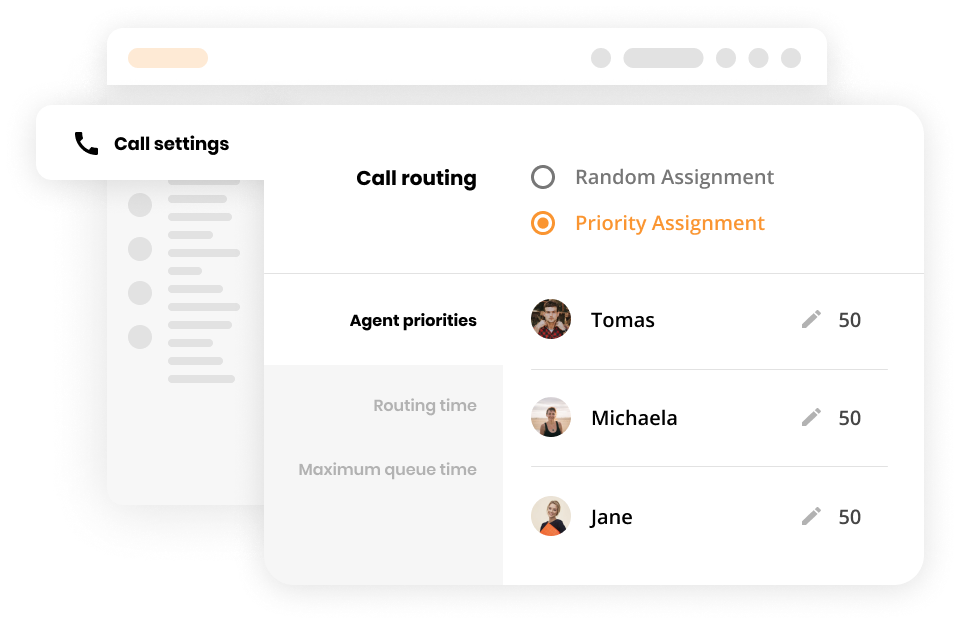
Offer real-time analytics
Make your business decisions based on data-driven insights. Contact center software can provide valuable real-time analytics on sales trends, customer behavior, range of user, agent performance, and more. This makes it easier to identify areas for improvement and measure the success of your customer service strategies accurately.
Factors to consider while deciding on contact center software
While picking the perfect contact center software solution, consider several key factors outside the before mentioned features. Let’s quickly go over the most significant of these factors.
- Ease of integration: Think about your current tech ecosystem. Will the new contact center software easily integrate into your existing setup? Software like LiveAgent offers integration with numerous popular tools like WordPress, Magento, Slack, and others, which can simplify the integration process.
- Scalability: As your business grows, your software needs to grow with it — can the software scale as per your requirements? An inability to scale could hinder customer service levels and growth plans.
- Reliability and uptime: You cannot afford for your contact center to be offline. It is absolutely critical to ask, “What is the software’s uptime record?” Consider solutions with 99.9% uptime or more.
- Security features: In today’s digital world, protecting customers’ information is paramount. Does the proposed software meet the necessary regulatory compliance for data security in your industry?
- Ease of use: Will your staff need extensive training to get started with the software? Look for software with an intuitive user interface to ensure the quickest path to team adoption and the best agent experience. For example, LiveAgent boasts a user-friendly design and easy-to-understand features.
- Quality of support: Evaluate the center provider’s customer support. When your team needs help, will they get it quickly and easily?
- Cost effectiveness: Lastly, remember that expensive does not always equate to better. Consider whether the software offers good value for the money. Look for a mix of functionality, customer service, and fair pricing in the software — LiveAgent can be a good example of such a balance.
When is the right time to acquire contact center software?
How can you determine the right moment to invest in a contact center solution? Let’s explore real-life scenarios that may compel businesses to explore contact center software options.
High volume of customer queries
If businesses are experiencing an unprecedented influx of customer queries, it can severely impact customer service quality.
For example, during Black Friday, a retail business may receive an overwhelming number of requests, order inquiries, or complaint calls. Contact center software can automate responses for common inquiries, distribute workload evenly among contact center agents, and streamline ticket tracking, freeing up time for agents to handle more complex inquiries.
Inefficient call routing
For contact centers to perform at their best, it is crucial to route customer inquiries, especially calls.
A hospital, for example, may experience misrouting of calls to the wrong departments or individuals, causing a delay in providing critical information or medical assistance. Contact center software can vastly improve call routing accuracy by assigning calls based on predetermined rules, ensuring patients’ calls are directed to the right doctor or department.
Increasing costs of operations
Operational and maintenance costs often increase significantly when a business expands. Contact center software can mitigate this issue while improving agents’ productivity.
As a rapidly expanding airline adds new routes, operational costs can rise with more customer service reps. Using contact center software powered by Amazon Web Services, AI-driven IVRs and chatbots can handle routine inquiries, reducing the need for human agents and leading to cost savings.
Poor customer service feedback
Customer feedback can make or break a business. Therefore, it is paramount that you keep your customers satisfied.
If a broadband internet service provider is dealing with complaints about long waiting times or poor issue resolution, this signals a poor customer experience. Contact center software can help manage the queue effectively, monitor calls for quality assessment, and provide data-driven actionable insights to improve customer service.
Remote working conditions
In remote working situations, such as during the Covid-19 pandemic, contact center software with features like ACD, IVR, multi-channel support, and virtual phones ensures smooth customer service operations. Solutions like CXone Mpower offer robust functionality, real-time analytics, and advanced call routing to meet customer support requirements.
Conclusion
In a competitive business environment, optimizing customer interactions is indispensable. Good contact center software can provide seamless multichannel experiences, improve team productivity, enhance customer experience, and result in cost savings — all leading to improved business success.
Evaluate potential contact center solutions based on features like ticket management, live chat, social media integration, automation, and robust analytics. Analyze the software’s ease of integration, scalability, uptime, security, user interface, and cost-effectiveness to ensure that it aligns with your specific needs.
Consider crucial factors like high query volumes, inefficient routing, high operational costs, poor service feedback, and remote working situations to determine whether it’s time to incorporate this software into your business.
To take the first step towards revolutionizing your customer service center, consider starting with LiveAgent’s free 30-day trial and experience the difference firsthand.
Looking to improve your contact center?
Unleash your business potential with LiveAgent's contact center software. Start your free trial now and experience the change!
Smart customer satisfaction software
Boost customer satisfaction in 2025 with LiveAgent! Deliver personalized, 24/7 support on every channel. Free trial, no credit card needed.

 Български
Български  Čeština
Čeština  Dansk
Dansk  Deutsch
Deutsch  Eesti
Eesti  Español
Español  Français
Français  Ελληνικα
Ελληνικα  Hrvatski
Hrvatski  Italiano
Italiano  Latviešu
Latviešu  Lietuviškai
Lietuviškai  Magyar
Magyar  Nederlands
Nederlands  Norsk bokmål
Norsk bokmål  Polski
Polski  Română
Română  Русский
Русский  Slovenčina
Slovenčina  Slovenščina
Slovenščina  简体中文
简体中文  Tagalog
Tagalog  Tiếng Việt
Tiếng Việt  العربية
العربية  Português
Português 
